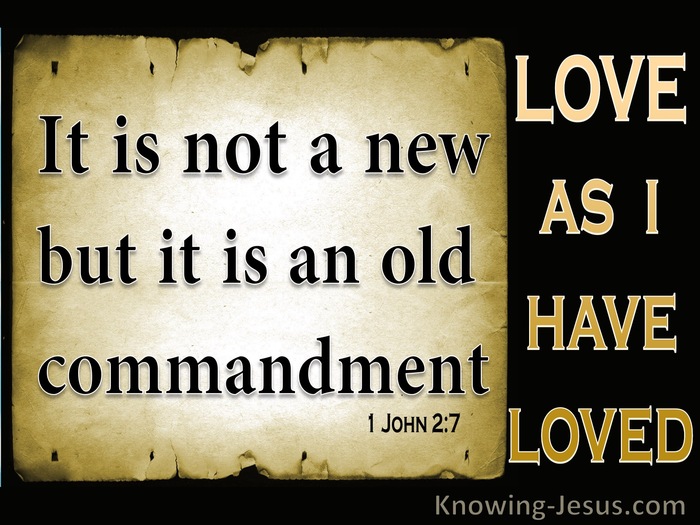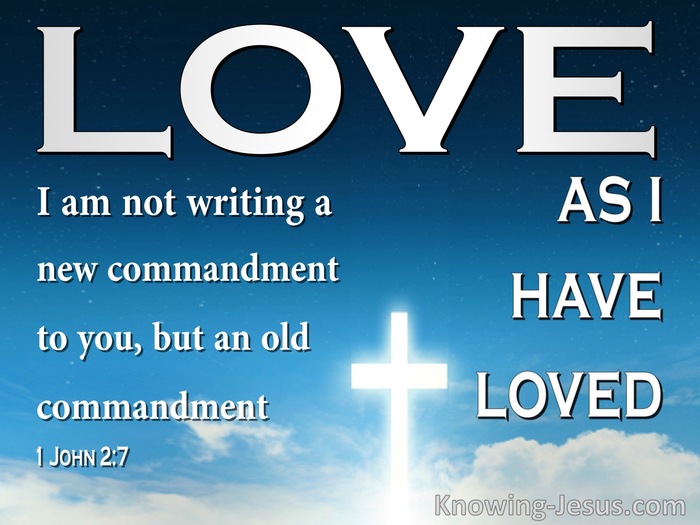Parallel Verses
Amplified
Beloved, I am not writing a new commandment to you, but an old commandment which you have had from the beginning; the old commandment is the message which you have heard [before from us].
New American Standard Bible
King James Version
Brethren, I write no new commandment unto you, but an old commandment which ye had from the beginning. The old commandment is the word which ye have heard from the beginning.
Holman Bible
Dear friends, I am not writing you a new command
International Standard Version
Dear friends, I am not writing to you a new commandment, but an old commandment that you have had from the beginning. This old commandment is the word you have heard.
A Conservative Version
Brothers, I write no new commandment to you, but an old commandment that ye had from the beginning. The old commandment is the word that ye heard from the beginning.
American Standard Version
Beloved, no new commandment write I unto you, but an old commandment which ye had from the beginning: the old commandment is the word which ye heard.
An Understandable Version
My dearly loved ones, I am not writing to you about a new commandment, but about an old one. [It is the one] you had learned about from the beginning. [Note: This is the commandment to love one another (3:1: II John 5) which Jesus had taught his disciples during His earthly ministry. See Mark 12:31]. This old commandment is the word [of God] which you heard [previously].
Anderson New Testament
Beloved, I write no new commandment to you, but an old commandment, which you have had from the beginning; the old commandment is the word, which you have heard from the beginning.
Bible in Basic English
My loved ones, I do not give you a new law, but an old law which you had from the first; this old law is the word which came to your ears.
Common New Testament
Beloved, I am writing you no new commandment, but an old commandment that you had from the beginning. The old commandment is the word that you have heard.
Daniel Mace New Testament
My brethren, I don't prescribe you any new commandment, but the antient precept which you had from the beginning: and that is no other than the word which was originally delivered.
Darby Translation
Beloved, I write no new commandment to you, but an old commandment, which ye have had from the beginning. The old commandment is the word which ye heard.
Emphatic Diaglott Bible
Brethren, I do not write a new commandment to you; but an old commandment, which you had from the beginning. The old commandment is the word, which you have heard from the beginning.
Godbey New Testament
Beloved, I write no new commandment to you, but the old one which you had from the beginning; the old commandment is the word which you have heard.
Goodspeed New Testament
Dear friends, it is no new command that I am writing you, but an old one that you have had from the beginning. That old command is the same as the message you have heard.
John Wesley New Testament
Beloved, I write not a new commandment to you, but the old commandment, which ye have had from the beginning; the old commandment is the word which ye have heard from the beginning.
Julia Smith Translation
Brethren, I write no new command to you, but an old command which ye had from the beginning. The old command is the word which ye heard from the beginning.
King James 2000
Brethren, I write no new commandment unto you, but an old commandment which you had from the beginning. The old commandment is the word which you have heard from the beginning.
Lexham Expanded Bible
Dear friends, I am not writing a new commandment to you, but an old commandment which you have had from the beginning. The old commandment is the message which you have heard.
Modern King James verseion
Brothers, I do not write a new commandment to you, but an old commandment which you had from the beginning. The old commandment is the Word which you have heard from the beginning.
Modern Spelling Tyndale-Coverdale
Brethren, I write no new commandment unto you: but an old commandment which ye had at the beginning. For an old commandment is the word which ye heard from the beginning.
Moffatt New Testament
Beloved, I am not writing you any new command, but an old command which you have had from the very beginning: the old command is the word you have heard.
Montgomery New Testament
Beloved, I am not writing a new commandment to you, nay, and old commandment, which you have had from the beginning. That old commandment is the message to which you have listened.
NET Bible
Dear friends, I am not writing a new commandment to you, but an old commandment which you have had from the beginning. The old commandment is the word that you have already heard.
New Heart English Bible
Beloved, I write no new commandment to you, but an old commandment which you had from the beginning. The old commandment is the word which you heard.
Noyes New Testament
Beloved, I write no new commandment to you, but an old commandment, which ye have had from the beginning. The old commandment is the word which ye have heard.
Sawyer New Testament
Beloved, I write not a new commandment to you, but an old commandment, which you had from the beginning; the old commandment is the word which you heard.
The Emphasized Bible
Beloved! no new commandment, am I writing unto you; but an old commandment, which ye have been holding from the beginning: The old commandment is the word which ye have heard.
Thomas Haweis New Testament
Brethren, I write not a new commandment unto you, but an old commandment which ye had from the beginning: the old commandment is the word which ye have heard from the beginning.
Twentieth Century New Testament
Dear friends, it is no new command that I am writing to you, but an old command, which you have had from the first. That old command is the Message to which you listened.
Webster
Brethren, I write no new commandment to you, but an old commandment which ye had from the beginning: The old commandment is the word which ye have heard from the beginning.
Weymouth New Testament
My dearly-loved friends, it is no new command that I am now giving you, but an old command which you have had from the very beginning. By the old command I mean the teaching which you have already received.
Williams New Testament
Dearly beloved, I am not writing you a new command, but an old one that you have had from the beginning. That old command is the message that you have heard.
World English Bible
Brothers, I write no new commandment to you, but an old commandment which you had from the beginning. The old commandment is the word which you heard from the beginning.
Worrell New Testament
Beloved, I write no new commandment to you, but and old commandment which ye had from the beginning. The old commandment is the word which ye heard.
Worsley New Testament
Brethren, I write not a new commandment unto you, but an old commandment which ye had from the beginning: the old commandment is the word which ye have heard from the beginning:
Youngs Literal Translation
Brethren, a new command I write not to you, but an old command, that ye had from the beginning -- the old command is the word that ye heard from the beginning;
Interlinear
Entole
ἐντολή
Entole
ἐντολή
Entole
Usage: 47
Usage: 47
Hos
ὅς ἥ ὅ
Hos
which, whom, that, who, whose, what, that which, whereof,
Usage: 980
References
Easton
Fausets
Hastings
Word Count of 38 Translations in 1 John 2:7
Prayers for 1 John 2:7
Verse Info
Context Readings
God's Commands
6
whoever says he lives in Christ [that is, whoever says he has accepted Him as God and Savior] ought [as a moral obligation] to walk and conduct himself just as He walked and conducted Himself.
7 Beloved, I am not writing a new commandment to you, but an old commandment which you have had from the beginning; the old commandment is the message which you have heard [before from us].
Cross References
1 John 3:11
For this is the message which you [believers] have heard from the beginning [of your relationship with Christ], that we should [unselfishly] love and seek the best for one another;
Leviticus 19:18
You shall not take revenge nor bear any grudge against the sons of your people, but you shall love your neighbor (acquaintance, associate, companion) as yourself; I am the Lord.
2 John 1:5-6
Now I ask you, lady, not as if I were writing to you a new commandment, but [simply reminding you of] the one which we have had from the beginning, that we
Leviticus 19:34
But the stranger who resides with you shall be to you like someone native-born among you; and you shall love him as yourself, for you were strangers in the land of Egypt; I am the Lord your God.
Deuteronomy 6:5
You shall love the Lord your God with all your heart and mind and with all your soul and with all your strength [your entire being].
Matthew 5:43
Matthew 22:37-40
And Jesus replied to him,
Mark 12:29-34
Jesus answered,
Acts 17:19
They took him and brought him to the
Romans 13:8-10
Galatians 5:13-14
For you, my brothers, were called to freedom; only do not let your freedom become an opportunity for the
James 2:8-12
If, however, you are [really] fulfilling the royal law according to the Scripture, “You shall love your neighbor as yourself [that is, if you have an unselfish concern for others and do things for their benefit]” you are doing well.
1 John 2:24
As for you, let that remain in you [keeping in your hearts that message of salvation] which you heard from the beginning. If what you heard from the beginning remains in you, you too will remain in the Son and in the Father [forever].
1 John 3:23
This is His commandment, that we believe [with personal faith and confident trust] in the name of His Son Jesus Christ, and [that we unselfishly] love and seek the best for one another, just as He commanded us.





